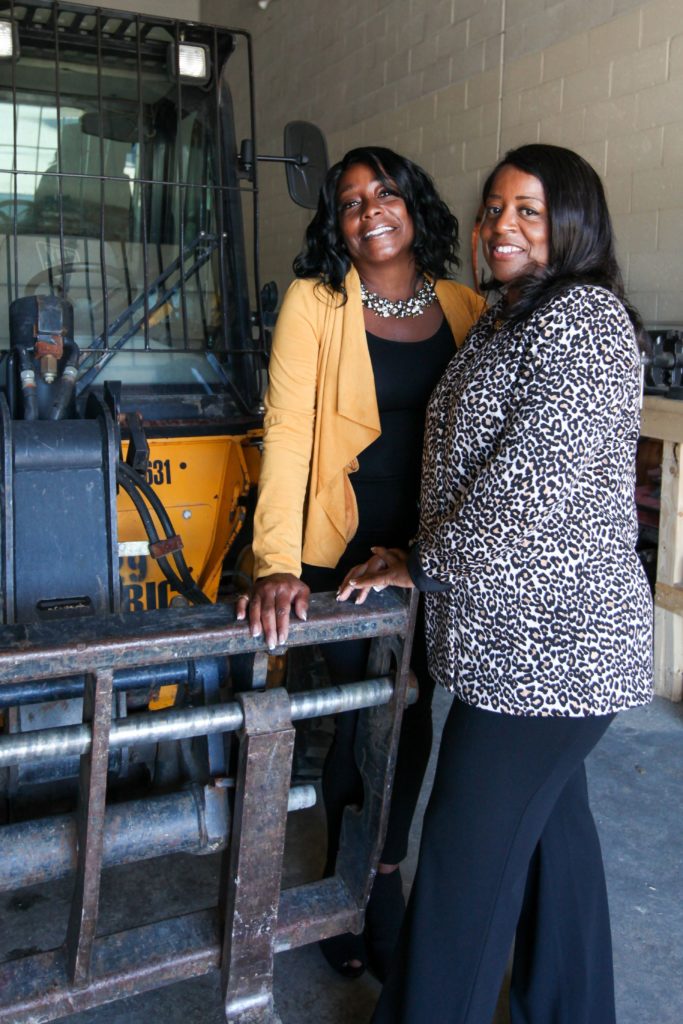Networking is a proven way to gain clients and meet like-minded people and for Shelley Webster and Tiffony Cesero, it was a catalyst for a joint business venture.
The two women already led successful businesses when they first met seven years ago doing volunteer work for the Massachusetts Minority Contractors Association, a board they both served on. Both women worked in the construction industry, albeit in different capacities.
“We just clicked,” Webster explains.
They put their heads together to find ways the businesses could complement each other and
five years later, they formed the startup ST Materials and Equipment Supply Company, based in Plymouth. It’s actually three companies under one umbrella, built on relationships both women have forged over the past 40 years.
ST Materials Equipment and Supply provides general construction materials and supplies, including a wide range of pipes, tubing and safety products. The company also offers purchasing and procurement project management services.
Webster owns In Order Business Development Solutions, Inc. a certified Minority- and Women- Owned Business Enterprise (MWBE) firm that specializes in providing diversity and business capacity building solutions to real estate developers, construction managers, emerging and mid-size construction firms.
Cesero is the owner of K-9 Mercantile Protection, Inc., a security company with more than 39 years of experience providing armed and unarmed guard services, guards accompanied by a K-9, personal protection, private investigative work and camera installation. Her clients cross many industries including construction, retail, medical, education, and both commercial and private sectors. She’s also a notary public.
In addition, Cesero’s son Andrell Hardaway, is vice president of sales.

Women In Non-Traditional Fields
While both Webster and Cesero work in what’s more thought of as a man’s field, they both had early backgrounds in construction.
“I got into construction in the early 1980s,” explains Webster. “I went into business with my dad right out of high school. He had a heavy construction business but in 2005 he shut down the business to do something else.”
Her brothers asked her about reopening the business and they launched a site and underground utilities company, dealing with projects in Boston and particular Dorchester.
“Construction, especially underground utilities work in Boston, can be very high risk and low return. I decided to do something less risky, just as rewarding and pays every week,” Webster says with a laugh.
A business associate convinced Webster to use her skills in management and dealing with Minority Business Enterprises (MBE) to start her own business in 2014 to help emerging MBEs and WBEs (Women Business Enterprises). The goal was to get minority and women-owned businesses onto construction sites and create a more diverse workplace. A recent client was Encore Boston Harbor Hotel.
The clarion call of the Black Lives Matter movement was a boon to Webster’s consulting business. “People are taking a harder look at what diversity means and I’ve been extremely busy,” she says. “More and more, companies are seeking to increase their construction and goods and services spend with historically underutilized businesses. They contact me to talk about their goals and objectives and help create a diversity strategy that includes outreach efforts to solicit and engage those businesses.
“It’s very important to help these businesses that are under-utilized,” she notes.
An adjunct service is helping those businesses become certified as MBEs or WBEs, assisting them with financing to help them build their capacity. Many small businesses, she says, lack the capacity of “back office” services such as accounting, service, delivery and administration.
“MBE’s in particular have not gained equal footing in the marketplace due to past discrimination so especially lack the back office infrastructure,” Webster adds. “We partner with a good legal team, CPAs, bookkeepers and others to provide advice and services to these companies.”
The Massachusetts Minority Contractors Association (https://www.themmca.org) which represents more than 100 minority-owned businesses, says the reasons why M/WBEs are under-utilized in government contracting are “well known” due to a number of factors including, municipalities that prefer to work with firms they have always worked with and contract stipulations that preclude the businesses from participating, such as requiring the company to bid for a year’s worth of supplies rather than breaking down the contract into smaller components or requiring an architectural contract to have have 20 or more years of experience in a particular type of design, “even though other skills and abilities of a newer firm might be transferable.” Even subcontracting opportunities have historically shut out MBE’s.
“Prime contractors tend to simply go back to subcontractors they have used in the past – an ‘old boys network’ that excludes M/WBEs,” the MMCA wrote in a 2019 letter to the City of Boston.
K-9 Mercantile was founded in 1981 by Cesero’s husband and father-in-law (a retired Boston policeman), though now she is the sole owner. A federally certified business, K-9 holds the only guard dog license in Massachusetts. Services include armed guards with K-9 patrols, security camera installations and securing construction sites, which represents more than half the business’s revenue. Employees number over 100, many of whom are retired or active military personnel.
Relationship Builders
Both women have different management styles which serve to strengthen their fledgling business venture.
“”I’m the introvert and the behind the scenes facilitator of the team,” says Webster. “Tiffony is the extrovert who is able to effectively engage and close deals, while making the business fun.”
More importantly, being connected to their communities is key to building business relationships, they say.
For the past 12 years, Cesero has been a member of the board of the Old Colony YMCA (Plymouth) and its chair for the past three years. She’s also vice president of the Plymouth Rotary Club, a board member of the Plymouth area Salvation Army and a member of Bridgewater State University’s Business Advisory Board. She has served on her town’s charter committee and has been involved in the schools.
“It’s my passion to see the rewards for folks who really need it,” she says.
Cesero was honored this year as a “Heroine” by the Massachusetts Committee on the Status of Women for her “extraordinary volunteerism and service.”
Webster is likewise passionate about supporting young women considering trades as a career and serves on the several Massachusetts boards, including Girls in Trades, which introduces young adult women enrolled in Massachusetts vocational high schools to union building trades; Youthbuild Boston, which provides underserved young people with the support, training and credentials to successfully enter the building trades; and Building Pathways, which creates opportunities for low-income residents in underserved communities, to access and prepare for building trades apprenticeships.
Pandemic Challenges
The construction industry took a hit early on when the governor implemented business closures to attempt to control the spread of the COVID-19 virus.
“With the work stoppage in March 2020, it was a little tricky,” admits Cesero. :”A lot of
construction sites we were placed on hold or incurred actual work stoppages by the Governor.
Despite that, we managed to keep a lot of our staff afloat.”
However, the State mandated work-stoppage caused the purchasing of any construction supplies to be delayed.
“We were afraid to purchase anything,” says Cesero “We ended up putting a lot on hold and it delayed us several months.”
The closing of colleges and universities and hospitals cutting back on patient intake meant fewer security guards were needed, but Cesero is hopeful that side of the business will eventually return.
“A lot of infrastructure is not coming back,” she acknowledges. “But I’m a fighter, We’ve weathered recessions, especially in the security industry and while adverse things happen, there’s always an opportunity as well. I envision being in the surf, riding a wave and wondering, ‘how am I going to get through?’ I just hang on! We’ve got a lot of irons in the fire, and we will persevere.”
For more information, visit https://www.stmaterialsequipment.com/























